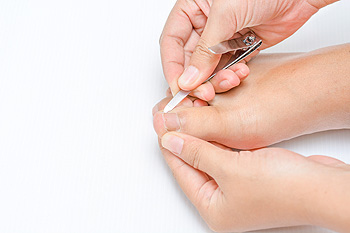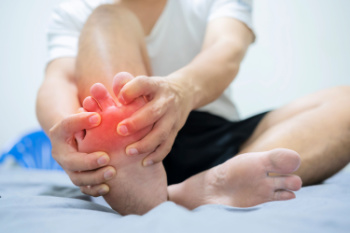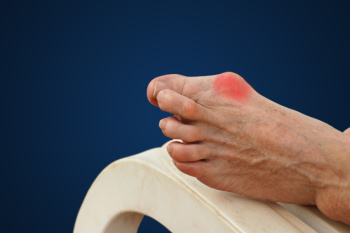Connect With Us
Blog

Ingrown toenails occur when the edge of a toenail grows into the surrounding skin, causing pain, swelling, and sometimes infection. This condition most often affects the big toe and can result from improper nail trimming, wearing tight shoes, injury, or a genetic tendency. Early-stage ingrown toenails may respond to warm soaks, gentle lifting of the nail edge, and wearing open or roomier shoes. However, if there is redness, pus, or worsening pain, professional care is necessary. A podiatrist can safely remove the portion of the nail that is causing the problem and may prescribe antibiotics if infection is present. In recurring cases, a simple in-office procedure can prevent the nail from growing inward again. Attempting to treat an ingrown nail at home can increase the risk of complications. For relief and long-term prevention, it is suggested that you see a podiatrist.
Ingrown toenails may initially present themselves as a minor discomfort, but they may progress into an infection in the skin without proper treatment. For more information about ingrown toenails, contact one of our podiatrists of Granite State Podiatry Associates. Our doctors can provide the care you need to keep you pain-free and on your feet.
Ingrown Toenails
Ingrown toenails are caused when the corner or side of a toenail grows into the soft flesh surrounding it. They often result in redness, swelling, pain, and in some cases, infection. This condition typically affects the big toe and may recur if it is not treated properly.
Causes
- Improper toenail trimming
- Genetics
- Improper shoe fitting
- Injury from pedicures or nail picking
- Abnormal gait
- Poor hygiene
You are more likely to develop an ingrown toenail if you are obese, have diabetes, arthritis, or have any fungal infection in your nails. Additionally, people who have foot or toe deformities are at a higher risk of developing an ingrown toenail.
Symptoms
Some symptoms of ingrown toenails are redness, swelling, and pain. In rare cases, there may be a yellowish drainage coming from the nail.
Treatment
Ignoring an ingrown toenail can have serious complications. Infections of the nail border can progress to a deeper soft-tissue infection, which can then turn into a bone infection. You should always speak with your podiatrist if you suspect you have an ingrown toenail, especially if you have diabetes or poor circulation.
If you have any questions, please feel free to contact our offices located in Manchester and Bedford, NH . We offer the newest diagnostic and treatment technologies for all your foot care needs.

When a child walks on their toes without a medical cause, known as idiopathic toe walking, finding the right solution can be challenging. Two common devices used to address this issue are ankle-foot orthoses, or AFOs, and foot orthoses, FOs. AFOs tend to be more effective in altering walking patterns during treatment. However, some children return to toe walking once the device is removed. FOs offer a more comfortable and less restrictive option, making them more appealing to children and parents. Although FOs may not correct the walking pattern as strongly during use, children often maintain similar improvements when not wearing them. The balance between effectiveness and comfort is key when choosing a treatment. A podiatrist can help determine which option is most suitable for your child’s specific needs and lifestyle. If your child is toe walking, it is suggested that you see a podiatrist for a proper diagnosis and treatment.
If you are having discomfort in your feet and would like to try orthotics, contact one of our podiatrists from Granite State Podiatry Associates. Our doctors can provide the care you need to keep you pain-free and on your feet.
What Are Orthotics?
Orthotics are inserts you can place into your shoes to help with a variety of foot problems such as flat feet or foot pain. Orthotics provide relief and comfort for minor foot and heel pain but can’t correct serious biomechanical problems in your feet.
Over-the-Counter Inserts
Orthotics come in a wide variety of over-the-counter inserts that are used to treat foot pain, heel pain, and minor problems. For example, arch supports can be inserted into your shoes to help correct overarched or flat feet, while gel insoles are often used because they provide comfort and relief from foot and heel pain by alleviating pressure.
Prescription Orthotics
If over-the-counter inserts don’t work for you or if you have a more severe foot concern, it is possible to have your podiatrist prescribe custom orthotics. These high-quality inserts are designed to treat problems such as abnormal motion, plantar fasciitis, and severe forms of heel pain. They can even be used to help patients suffering from diabetes by treating foot ulcers and painful calluses and are usually molded to your feet individually, which allows them to provide full support and comfort.
If you are experiencing minor to severe foot or heel pain, it’s recommended to speak with your podiatrist about the possibilities of using orthotics. A podiatrist can determine which type of orthotic is right for you and allow you to take the first steps towards being pain-free.
If you have any questions please contact our offices located in Manchester and Bedford, NH . We offer the newest diagnostic and treatment technologies for all your foot and ankle needs.

Toe pain can make everyday activities uncomfortable, whether you are walking, running, or simply wearing shoes. Common causes include bunions, hammertoes, ingrown toenails, and arthritis. Repetitive stress from wearing tight shoes, high-impact activities, or foot deformities can also lead to inflammation and pain in the toes. If your toes are sore, swollen, or stiff, rest may provide temporary relief. Wearing shoes with a roomy toe box and good arch support can ease pressure on the joints. Stretching and strengthening exercises can improve flexibility and reduce discomfort. Persistent toe pain may signal a more serious problem, such as a stress fracture or nerve issue. If the pain does not improve or worsens, it is suggested that you see a podiatrist, who can diagnose the cause and recommend the right treatment.
Toe pain can disrupt your daily activities. If you have any concerns, contact one of our podiatrists of Granite State Podiatry Associates. Our doctors can provide the care you need to keep you pain-free and on your feet.
What Causes Toe Pain?
Most severe toe pain is caused due to a sports injury, trauma from dropping something heavy on the toe, or bumping into something rigid. Other problems can develop over time for various reasons.
Toe pain can be caused by one or more ailments. The most common include:
- Trauma
- Sports injury
- Wearing shoes that are too tight
- Arthritis
- Gout
- Corns and calluses
- Hammertoe
- Bunions
- Blisters
- Ingrown toenails
- Sprains
- Fractures (broken bones)
- Dislocations
When to See a Podiatrist
- Severe pain
- Persistent pain that lasts more than a week
- Signs of infection
- Continued swelling
- Pain that prevents walking
Diagnosis
In many cases the cause of toe pain is obvious, but in others, a podiatrist may want to use more advanced methods to determine the problem. These can range from simple visual inspections and sensation tests to X-rays and MRI scans. Prior medical history, family medical history, and any recent physical traumatic events will all be taken into consideration for a proper diagnosis.
Treatment
Treatments for toe pain and injuries vary and may include shoe inserts, padding, taping, medicines, injections, and in some cases, surgery. If you believe that you have broken a toe, please see a podiatrist as soon as possible.
If you have any questions please feel free to contact our offices located in Manchester and Bedford, NH . We offer the newest diagnostic tools and technology to treat your foot and ankle needs.

A bunion is more than just a bump on the side of your foot. It is a misalignment of the big toe joint that causes the bone to shift outward. This can lead to pain, swelling, and difficulty in finding comfortable shoes. Over time, as the big toe leans further toward the lesser toes, bunions can worsen, and additional foot problems like hammertoes or calluses can arise. Conservative treatments can help manage symptoms. Wearing supportive shoes with a wide toe box, using orthotics, and employing techniques to reduce inflammation are common strategies. For persistent pain or significant deformity, minimally invasive bunion surgery may be recommended to correct the alignment and relieve discomfort. Ignoring a bunion will not make it go away, and early intervention can prevent the condition from getting worse. If you have a painful bunion, it is suggested that you schedule an appointment with a podiatrist to discuss the best treatment options for it, as well as overall foot health.
If you are suffering from bunions, contact one of our podiatrists of Granite State Podiatry Associates. Our doctors can provide the care you need to keep you pain-free and on your feet.
What Is a Bunion?
A bunion is formed of swollen tissue or an enlargement of boney growth, usually located at the base joint of the toe that connects to the foot. The swelling occurs due to the bones in the big toe shifting inward, which impacts the other toes of the foot. This causes the area around the base of the big toe to become inflamed and painful.
Why Do Bunions Form?
Genetics – Susceptibility to bunions are often hereditary
Stress on the feet – Poorly fitted and uncomfortable footwear that places stress on feet, such as heels, can worsen existing bunions
How Are Bunions Diagnosed?
Doctors often perform two tests – blood tests and x-rays – when trying to diagnose bunions, especially in the early stages of development. Blood tests help determine if the foot pain is being caused by something else, such as arthritis, while x-rays provide a clear picture of your bone structure to your doctor.
How Are Bunions Treated?
- Refrain from wearing heels or similar shoes that cause discomfort
- Select wider shoes that can provide more comfort and reduce pain
- Anti-inflammatory and pain management drugs
- Orthotics or foot inserts
- Surgery
If you have any questions, please feel free to contact our offices located in Manchester and Bedford, NH . We offer the newest diagnostic and treatment technologies for all your foot care needs.
